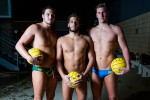As men’s water polo practice winds down in Spieker Aquatics Center, team members clamber from the pool onto the deck, shivering slightly in the cool fall air. In their practice wear, some members represent their high schools, hometown clubs or the Bruins. In contrast, sophomore center Gordon Marshall’s suit is emblazoned with one word: “Australia.”
There are currently three international players suiting up for UCLA: freshman utility Alex Roelse hails from the Netherlands, senior utility Cristiano Mirarchi comes from Italy, while Marshall grew up in Australia.
What these players bring to the team is more than just their different-colored swimsuits, however. Having all played under different coaches and different systems at the national and international level, each of them brings his own diverse personal experience to the Bruins.
“(The international players) have all had different coaches and different styles so we make different movements than the average American would,” Roelse said. “We think a little differently and that influences the game and the possibilities we have as a team, which is good.”
When they arrived in the States, each of the three international players had to adjust to the more aggressive American approach to water polo.
“It’s different here because it’s more fast-paced – a lot more counterattack, a lot of the guys are a lot fitter and it adds a different dynamic to the game,” Marshall said.
UCLA’s training regimen quickly transformed Marshall from a national team player from Newcastle, Australia into a competitor fit for the U.S. college level. The sophomore said focusing more on swimming made him faster, while increased weight training made him stronger in the water.
For Roelse, keeping up with the college level of competitiveness meant changing his approach to the sport and his own fitness level. Growing up in Maarssen, Netherlands, Roelse had some idea of the level of intensity surrounding sports in the United States because his mother was raised in the U.S. and swam competitively. Now, the freshman has to rise to the challenge of adjusting to his own sport in a different environment.
“I’ve been fitter, my body’s been adjusted. There’s no sleeping here, because everyone is actually fit so it’s not like you can relax for a second,” Roelse said. “You always have to be aware, you always have to be ready. Nobody’s sitting still.”
One of the reasons for the higher level of play on the U.S. college circuit is the popularity of the sport, particularly in California, which houses the highest number of high school water polo programs in the country. While water polo was one of the first team events to be introduced at the Olympics and has a storied past dating back to 1900, its international popularity is lacking, with fewer opportunities to play professionally as well as less media coverage and sponsorship.
“(Water polo) is a little bit bigger in the U.S. … I will say, there’s a lot of people playing water polo in California,” Mirarchi said. “I was surprised when I came (by) how many high schools have water polo teams while in Italy it’s mostly ran through clubs – there’s no sports teams.”
For Mirarchi, living in Rome meant that his school never offered a water polo team of its own, and so he always played at the club level. The senior utility sees this as giving his game an extra edge because he always had to play against older players.
Now, Mirarchi applies his unique water polo background to making UCLA a better team.
In recent years, No. 1 UCLA has stepped its game up when it comes to international recruiting. Southern California powerhouse No. 4 USC has always been known for its multinational makeup and currently lists five players from overseas on its roster. In contrast, fellow top-three contender Stanford has no international players in its lineup.
As the Bruins hunt for their first national championship in a decade, their team’s international component may be the the missing piece the team needs to succeed in its campaign.
